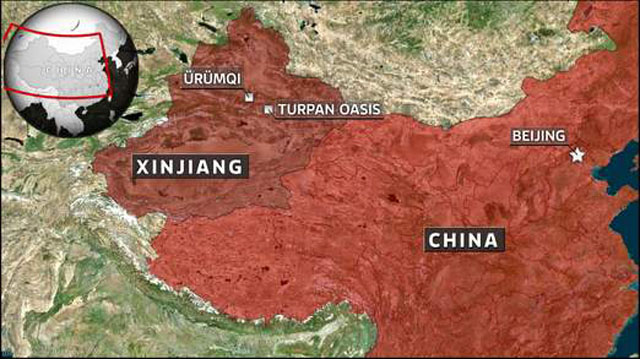
Muslim Uighur woman begs as armed Chinese paramilitary police march past on a street in Urumqi, the capital of the Xinjiang region,( GETTY)
The Turkish speaking Xinjiang province of China may have seen one of the bloodiest incidents in its history when knife-wielding assailants went on a stabbing rampage which killed 9 policemen and 16 civilans. The bloody attack in the Lukqun Township only ended when 10 of the attackers —who also set fire to police cars — were shot dead and three attackers were reportedly arrested. Describing the haphazard killings as a “riot”, state media agency says that a police station, government buildings and a construction site were targets of the attack which transpired at 6 a.m.
This brutal act of violence was not without motivation, in fact, this tragic incident uncovers the truth behind pronounced ethnic tension in the Xinjiang province, a region which borders Afghanistan and Pakistan.

Dilxat Raxit, a spokesman for the German-based World Uyghur Congress (an international organization of exiled Uyghur groups) told the AP that the conflict was triggered by the Chinese government’s “sustained repression and provocation” of the Uighur community. The Uigher people predominate in Turpan. The World Uyghur Congress describes itself as a nonviolent and peaceful movement that opposes what it considers to be the Chinese occupation of East Turkestan. The Chinese government has designated the WUC and its affiliate groups as a terrorist organisation, who it says have attempted to form a legitimate cover for their “illegal motives” to separate China.
According to a New York Times report, many members of the Uighur minority resent the growing presence in Xinjiang of Han Chinese people, whom they say get the better jobs and land. Tensions between the two groups have escalated in recent years, linked to the introduction of policies that call for much finer control and monitoring of local Uighur affairs.
This isn’t the first time ethnic tensions have escalated to violence The most significant confrontation transpired July 2006, in the capital of Xinjang when Uighurs attacked Han Chines after the police broke up a protests by the ethnic minority group. At least 197 people were killed.
